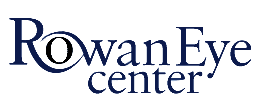You already know the importance of visiting your doctor for an annual physical check-up and receiving twice-yearly dental cleanings, but how often you should receive an eye exam isn’t as simple. Considering many vision problems have no obvious symptoms in their early stages, getting an eye exam regularly is important for maintaining good vision and eye health at every age. Keep reading to find out how often you should visit your eye doctor.
Healthy Adults
If you are in good general health, Dr. Rowan recommends receiving an eye exam once a year. If you wear glasses or contact lenses, an annual exam will help detect any changes in your vision and keep your prescription current. Yearly eye exams aren’t just for people with poor vision, however.
Even if your vision is 20/20 and you don’t have to squint to see a clock across the room or to read a book, it doesn’t mean you shouldn’t receive a regular eye exam. Comprehensive eye exams do much more than correct your vision. During your exam, your eye doctor can get a closer look at the inside of your eye, including the retina, optic nerve, and blood vessels.
This is especially important for the early detection and diagnosis of serious eye problems, which can occur without you being aware of or experiencing symptoms. Vision loss from diseases like macular degeneration and glaucoma cannot be reversed, so receiving preventive eye care annually is an important component in maintaining good eye health. Comprehensive eye exams can also help with the early diagnosis of health problems, such as high blood pressure and diabetes, before symptoms start showing up elsewhere in your body.
People with Special Risks
Although receiving an annual eye exam is a good rule of thumb to follow for most people, there are specific situations that may require seeing your eye care specialist more frequently. If you have an existing eye disease, such as glaucoma, macular degeneration, or a previous eye injury, you might need to receive an eye exam more than once a year. Additionally, if you are over the age of 60, or if you have chronic health problems, you may need more frequent exams as recommended by your eye doctor.
Signs You Need an Eye Exam Sooner
If you experience any of the following, schedule an appointment at Rowan Eye Center as soon as possible:
- Sudden loss of vision
- Double vision
- Eye pain
- Eye injury
- Seeing flashes of light
- A sudden increase in floaters (dark circles floating through your vision)
What Should Be Checked During an Eye Exam?
When you come in for your appointment, Dr. Rowan will conduct a comprehensive eye examination using the most up-to-date equipment to detect the early signs of glaucoma, cataracts, diabetic retinopathy, and other health problems. Your eye exam will also include checks on the following:
- Visual acuity: To test visual acuity, you will be asked to read a standard eye chart to test your vision at different distances.
- Your pupils: During this part of the exam, a bright light is shined into your eyes to test how your pupils respond to light.
- Eye movement: This part of the exam will test how your eyes track objects and their ability to move in different directions.
- Eye pressure: Since elevated eye pressure and loss of side vision can also be an early sign of glaucoma, they will be measured to make sure your eyes are healthy.
- The front part of the eye: To examine the front part of your eye, an instrument called a slit lamp shines a light into the eye.
- Your retina and optic nerve: Eye drops are placed inside each eye to dilate the pupil, allowing your eye care professional to check for early signs of disease or damage to your retina or optic nerve, located at the back of your eye.
Schedule Your Eye Exam
Considering the guideline of receiving an eye exam once a year does not apply to everyone, we recommend scheduling an appointment at Rowan Eye Center with Dr. Rowan. He will perform a comprehensive eye exam and determine how often you need to get your eyes checked based on your current health and unique needs. Contact us today and learn how we can help you see your future clearly.

